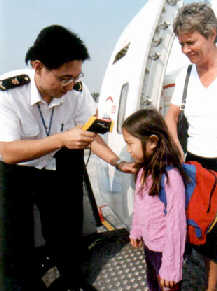Nation on alert for possible SARS recurrence
( 2003-09-11 15:56) (Agencies)
China has told health workers to be on alert for a possible re-emergence of SARS, redoubling temperature checks at airports and ordering local governments to practice emergency measures.

Airport staff hold thermometers to check the temperature of passengers on flight SQ802 from Singapore upon its arrival at the Beijing Capital International Airport on September 11, 2003. The passengers also have to show health certificates on their arrival. China is doubling its efforts to squash a possible resurgence of SARS, training scores of doctors and nurses, upgrading hospital surveillance and dispelling rampant rumors. [newsphoto.com.cn] |
Immigration inspectors must check all passengers traveling in or out of the country and send those with fevers or other cold symptoms to clinics, said a report on People's Daily. Such a step was part of an agreement during the outbreak by China and its Southeast Asian neighbors to cooperate in fighting SARS.
Passengers must complete forms declaring any symptoms and contact information, and inspectors must file daily reports on detection efforts, the newspaper said.
Health authorities have warned that the autumn flu season could see a re-emergence of severe acute respiratory syndrome, which killed 349 people in the Chinese mainland before ebbing in June.
Concern rose after a 27-year-old researcher in Singapore was confirmed on Tuesday as having SARS, the first new case anywhere since the World Health Organization declared the disease under control in early July.
Singaporean authorities said the man probably caught the disease while working in a laboratory that was investigating the virus rather than from another infected person.
China hasn't detected any new cases within the country yet.
The past year's outbreak prompted Beijing, the world's hardest-hit city, to close schools, cinemas and other public facilities. All of those have since reopened, but some airports continue to use remote scanners to check passengers for fever.
At the Beijing airport on Thursday, cameras scanned passengers approaching security checks.
Some government ministries and other public buildings in Beijing have similar checkpoints. Posters advertising how to prevent SARS are displayed prominently in department stores and at bus stops.
Health Ministry teams have been dispatched to Beijing and Guangdong to help strengthen precautions, the ministry's newspaper, Health News, reported.
Local governments have been ordered to conduct drills to check the effectiveness of their surveillance systems, the newspaper said, citing the deputy head of the ministry's infectious diseases department, Xiao Donglou.
``There is no evidence to suggest that SARS will return soon, but we haven't relaxed our alertness for even one second,'' Xiao was quoted as saying.
Beijing has opened 20 additional pneumonia detection stations in its suburbs, the newspaper Beijing Times reported. All 36 stations in the city that are annually activated to watch for outbreaks of respiratory illnesses have been told to start work on Monday - one month earlier than last year.
Guangdong province in the south, where SARS was first detected last November, has promised to notify neighboring Hong Kong quickly about cases of SARS and other public health emergencies.
|

